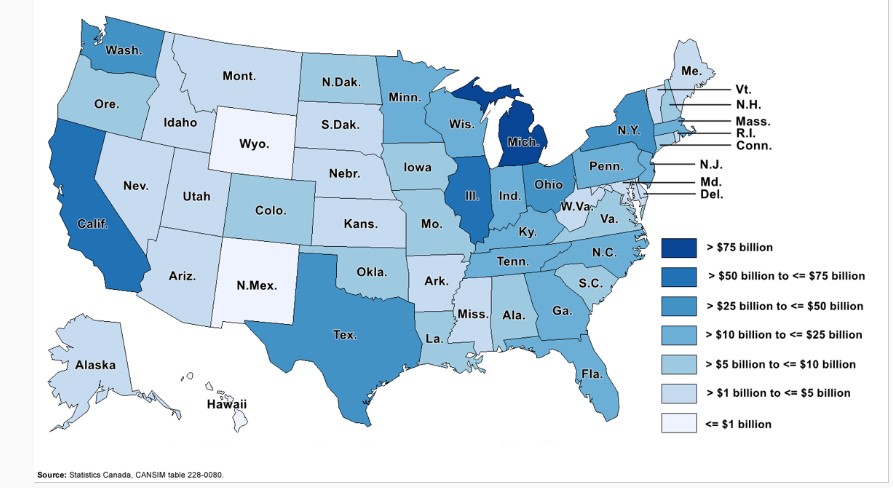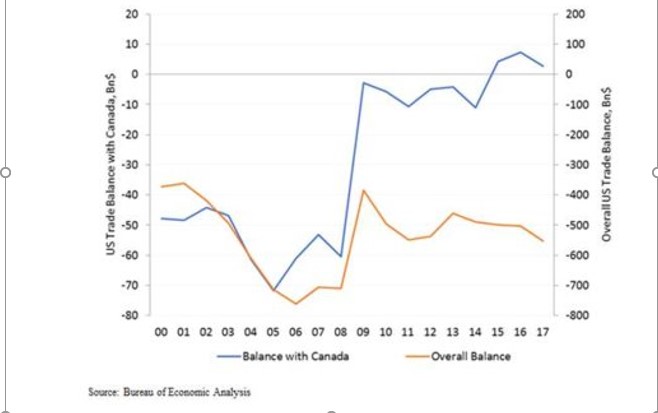It Is Easy To Understand Why The U.S. Has Backed Down On NAFTA Deadlines With Canada
The WSJ reported today that the United States is prepared to put on hold talks re-negotiating NAFTA with Canada. Threats and deadlines issued by President Trump has no impact on the Canadian trade negotiators. Canada seems to be no hurry to meet the demands of the President. Trade Representative Robert Lighthizer states that “there is still a fair amount of distance between us,” and “if Canada comes along later, then that’s what will happen.”[1]Moreover, the Canadian government realizes that “this emperor (Trump) wears no clothes”.
Politically, Canadians are fully behind their government, especially after Mr. Trump personally attacked Canadian Prime Minister Justin Trudeau in June following the Group of Seven summit in Quebec. There are also specific Canadian political issues, such as trade in dairy products. The upcoming election in Quebec, which is the largest dairy producing province, clearly makes it politically unwise for the Canadian government to agree to the U.S. demands.
Politics in the United States also plays into the hands of the Canadians. Two-way trade between Canada and individual key political states, such as Michigan, Illinois, California and Texas, exceeds $75 billion in each state (Figure 1). It is understandable why U.S. lawmakers and business groups have warned they oppose moving forward with a bilateral deal that excludes Canada. In total, two-way trade with Canada amounts to $581.6 billion in 2017 with goods exports totaled at $282.3 billion and goods imports totaled $299.3 billion. Should the President get into a tit-for-tat trade war with Canada, several key U.S. states stand to suffer job losses and markets to international competitors.
Figure 1: Two Way Trade with Canada

The facts regarding trade with Canada fly in the face of the President’s contention that NAFTA “is the worse deal” ever made. According to the U.S. Bureau of Economic Analysis, the United States runs a small surplus on trade with Canada.
Figure 2: US Trade Surplus with Canada

Canadians have been vindicated in recent decisions by the U.S. government’s own adjudicating body. For example, last month the U.S. International Trade Commission overturned the duties imposed on Canadian newsprint by the U.S. Dept of Commerce earlier this year. Canadians have often turned to this U.S.body successfully, and it is the main reason that the Canadian trade mission insists on maintaining a mechanism to resolve disputes within NAFTA.
The U.S.-Mexican agreement reached in late August, dealing primarily with the automotive industry, does not present any real challenge to the Canadian auto industry. The U.S. and Mexico agreed that 75% of automotive content (up from the current level of 62.5 %) be produced within the trade bloc to receive duty-free benefits. Without specific details, this requirement doesn’t mean much until it’s made clear which auto parts are included in that provision and which are exempt. Finally, Canadian wages are in the $20-28/hr range, so the stipulation regarding that 40 to 45 percent must be made by workers who earn at least US$16 an hour does not affect the Canadian industry.
Now that there will be no trilateral NAFTA agreement presented to this current U.S. Congress, all eyes will be on the outcome of the U.S. mid-term elections.
[1] Trade Deal Could Move Ahead Without Canada, According to U.S. Trade Representative, WSJ, Sept 25, 2018




Prof, it certainly is a clear choice in the election for those of us who are tired of the mistreatment of Canada by King of the World (in his own mind).
The detailed explanation was quite reassuring. Thanks for an educational article.
There is a certain advantage that I have living in Toronto when it comes to understanding U S trade policy.
Definitely true!